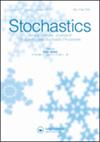Averaging principles for two-time-scale neutral stochastic delay partial differential equations driven by fractional Brownian motions
IF 0.9
4区 数学
Q3 MATHEMATICS, APPLIED
Stochastics-An International Journal of Probability and Stochastic Processes
Pub Date : 2023-09-16
DOI:10.1080/17442508.2023.2258250
引用次数: 0
Abstract
AbstractWe prove the validity of averaging principles for two-time-scale neutral stochastic delay partial differential equations (NSDPDEs) driven by fractional Brownian motions (fBms) under two-time-scale formulation. Firstly, in the sense of mean-square convergence, we obtain not only the averaging principles for NSDPDEs involving two-time-scale Markov switching with a single weakly recurrent class but also for the case of two-time-scale Markov switching with multiple weakly irreducible classes. Secondly, averaging principles for NSDPDEs driven by fBms with random delay modulated by two-time-scale Markovian switching are established. We proved that there is a limit process in which the fast changing noise is averaged out. The limit process is substantially simpler than that of the original full fast–slow system.Keywords: Averaging principlesneutral stochastic delay partial differential equationsrandom delayfractional Brownian motionstwo-time-scale Markov switching2010 Mathematics Subject Classifications: Primary: 60G22Secondary: 60H15 Disclosure statementNo potential conflict of interest was reported by the author(s).Additional informationFundingPei's work was partially supported by National Natural Science Foundation of China (NSFC) [grant number 12172285], NSFC-Chongqing [grant number cstc2021jcyj-msxmX0296], Shaanxi Fundamental Science Research Project for Mathematics and Physics [grant number 22JSQ027], Fundamental Research Funds for the Central Universities, Young Talent Fund of the University Association for Science and Technology in Shaanxi, China. Xu's work was partially supported by NSFC [grant number 12072264], and NSFC Key International (Regional) Joint Research Program [grant number 12120101002].分数布朗运动驱动的双时标中性随机时滞偏微分方程的平均原理
摘要证明了分数布朗运动驱动的双时间尺度中立型随机时滞偏微分方程(NSDPDEs)在双时间尺度下的平均原理的有效性。首先,在均方收敛的意义上,我们不仅得到了包含单个弱循环类的两时间尺度马尔可夫切换的NSDPDEs的平均原理,而且得到了包含多个弱不可约类的两时间尺度马尔可夫切换的NSDPDEs的平均原理。其次,建立了由双时间尺度马尔可夫切换调制的随机延迟fBms驱动的NSDPDEs的平均原理。我们证明了存在一个极限过程,在这个过程中快速变化的噪声被平均掉。极限过程比原来的全快慢系统要简单得多。关键词:平均原理中性随机延迟偏微分方程随机延迟分数布朗运动双时间尺度马尔可夫切换2010数学学科分类:初级:60g22次级:60H15披露声明作者未报告潜在利益冲突。项目资助:国家自然科学基金项目[批准号12172285]、重庆市自然科学基金项目[批准号cstc2021jcyj-msxmX0296]、陕西省数学与物理基础科学研究项目[批准号22JSQ027]、中央高校基本科研业务费专项资金、陕西省高校科协青年人才基金。徐的工作得到了国家自然科学基金委[批准号12072264]和国家自然科学基金委重点国际(地区)联合研究计划[批准号12120101002]的部分支持。
本文章由计算机程序翻译,如有差异,请以英文原文为准。
求助全文
约1分钟内获得全文
求助全文
来源期刊

Stochastics-An International Journal of Probability and Stochastic Processes
MATHEMATICS, APPLIED-STATISTICS & PROBABILITY
CiteScore
1.90
自引率
0.00%
发文量
42
审稿时长
>12 weeks
期刊介绍:
Stochastics: An International Journal of Probability and Stochastic Processes is a world-leading journal publishing research concerned with stochastic processes and their applications in the modelling, analysis and optimization of stochastic systems, i.e. processes characterized both by temporal or spatial evolution and by the presence of random effects.
Articles are published dealing with all aspects of stochastic systems analysis, characterization problems, stochastic modelling and identification, optimization, filtering and control and with related questions in the theory of stochastic processes. The journal also solicits papers dealing with significant applications of stochastic process theory to problems in engineering systems, the physical and life sciences, economics and other areas. Proposals for special issues in cutting-edge areas are welcome and should be directed to the Editor-in-Chief who will review accordingly.
In recent years there has been a growing interaction between current research in probability theory and problems in stochastic systems. The objective of Stochastics is to encourage this trend, promoting an awareness of the latest theoretical developments on the one hand and of mathematical problems arising in applications on the other.
 求助内容:
求助内容: 应助结果提醒方式:
应助结果提醒方式:


